KIN 3304: Exam 1, 2 and 3 combined
0.0(0)
0.0(0)
Card Sorting
1/149
Earn XP
Description and Tags
Study Analytics
Name | Mastery | Learn | Test | Matching | Spaced |
|---|
No study sessions yet.
150 Terms
1
New cards
Which law states that ligaments, muscles and other soft tissues will adapt over time to the stressed placed upon them?
Davis's law
2
New cards
Which law states that bones reshape themselves based on the stresses placed upon them?
Wolff's law
3
New cards
Compound movable pulley provide which of the following functions?
Move a heavy load with less physical effort
Provides mechanical advantage
Provides mechanical advantage
4
New cards
When flexing the hip maximally and simultaneously extending the knee, the hamstring can reach ______?
Active insufficiency
5
New cards
How much muscles tension is required to balance a 5 newton resistance, given that the distance between the weight and the joint is 20 centimeters and the distance between the muscle tendon of insertion is 10 centimeters?
10
6
New cards
How much muscle tension is required to balance a 10 newton resistance, given that the distance between the resistance and the joint is 40 centimeters and the distance between the muscle tendon of insertion and the joints 10 centimeters?
40
7
New cards
A muscle can develop different degrees of tension by altering?
changing the length of the muscle fibers before contraction
8
New cards
Which of the following is NOT a true statement about antagonist muscle?
These muscles work against agonist muscles by contracting and preventing movement
9
New cards
You are sitting on a table with your knee extended maximally. Very slowly, you flex your knee maximally. What type of muscle contraction occurs during this movement?
Quadriceps: concentric
Hamstrings: eccentric
Hamstrings: eccentric
10
New cards
Tension development is minimized in muscle fibers that are _____ of their resting length?
stretched (130%)
11
New cards
The length of the muscle during its contraction is a factor in ______?
The amount of force produced
12
New cards
Which of the following would increase the amount of force needed to move a lever?
Increase in resistance
13
New cards
What happens when successive stimuli are provided to a muscle before the relaxation phase of the first twitch is complete?
If 2nd stimulus is given before relaxation phase of the 1st is complete, it combines with the 1st
Generates a greater amount of tension than a single contraction would produce individually (summation)
Generates a greater amount of tension than a single contraction would produce individually (summation)
14
New cards
Reciprocal inhibition?
When the agonist muscles contract, the antagonist muscle must relax and lengthen
15
New cards
The distal interphalangeal joints within the fingers are an example of ______ joint?
Hinge joint
16
New cards
Which of the following is NOT a characteristic for which skeletal muscles are typically named?
Visual appearance (size, shape)
Anatomical location (where they are located, origin and insertion)
Function (Adductor, abductor, flexor, extensor, etc)
Really a combination of two or more of these features
Anatomical location (where they are located, origin and insertion)
Function (Adductor, abductor, flexor, extensor, etc)
Really a combination of two or more of these features
17
New cards
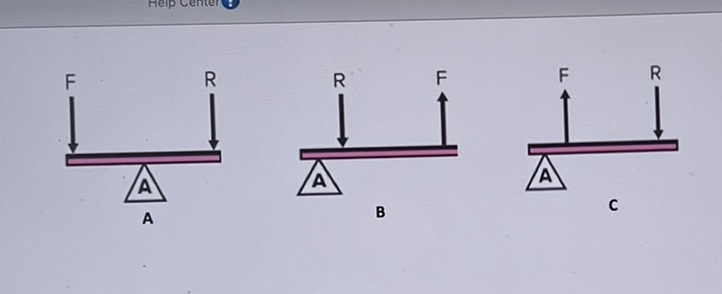
Of the levers illustrated, select that which is best suited to increase speed and ROM?
C. third class lever
18
New cards
You are attempting to flex your elbow maximally. What strategy do your elbow flexors (EX: bicep brachii) use to increase the amount of muscle tension?
Shortening the resistance arm
19
New cards
Which statement about muscle origins and insertion is NOT CORRECT?
Origin: proximal part of the body, most stable
Insertion: distal part of the body, most mobile
Insertion: distal part of the body, most mobile
20
New cards
You are lying prone on a table with your knees extended. What type of contraction is occurring at the hamstring as you lie still?
None or isometric
21
New cards
A ball-and-socket joint has _____ degrees of freedom, which a hinge joint has _____ degree of freedom
three, one
22
New cards
Muscles which work in cooperation with prime movers by relaxing and allowing movements are _____ muscles.
Antagonist
23
New cards
You are asked to determine what movement the concentric contraction of a certain muscle will cause. Which of the following is NOT one of the main considerations to bear in mind as you determine the potential movement?
???
24
New cards
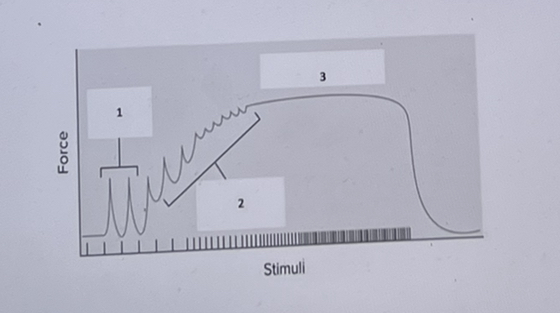
In the image below, what is indicated by #2?
Summation
25
New cards
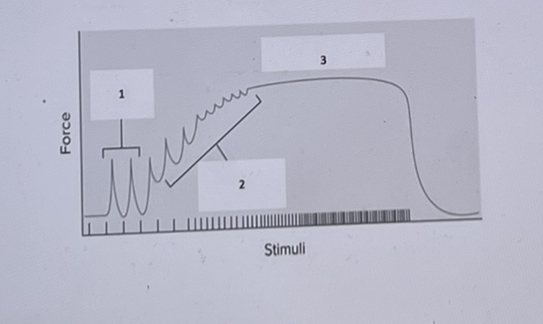
In the image below, what is indicated by #3?
Tetanus
26
New cards
Which of the following levers would be best to use to move a specific object if your objective was to increase mechanical advantage?
2nd class
27
New cards
Which of the following does NOT provide static stability to a diarthrodial joint?
Static stability:
Bony architecture
Cartilaginous structure
Ligamentous and connective tissue laxity
Bony architecture
Cartilaginous structure
Ligamentous and connective tissue laxity
28
New cards
Muscle strength, endurance, and flexibility provides ______ stability to a diarthrodial joint
Dynamic
29
New cards
How much force is required to balance 10 newtons of resistance, given a force arm of 5 cm and a resistance arm of 10cm?
20
30
New cards
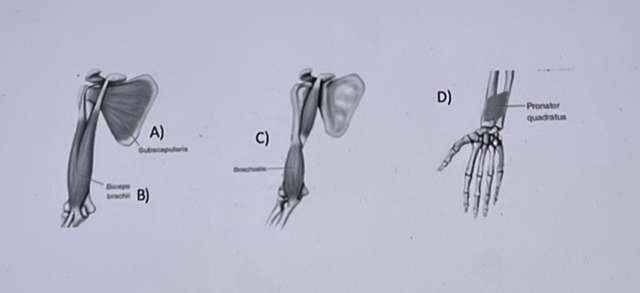
Which of the following is an example of a biarticular muscle?
A. Bicep brachii
31
New cards
Bony articulations that allow very slight movements are classified as?
Amphiarthrodial joint
32
New cards
Which of the following statement best describes the resistance arm?
Distance between axis and point of resistance
33
New cards
Which of the following statements best describes the fulcrum?
Axis of rotation
34
New cards
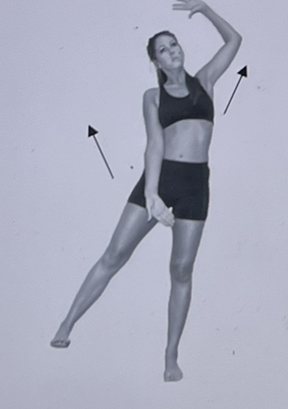
In the figure, what is the position of the left knee?
Extension
35
New cards
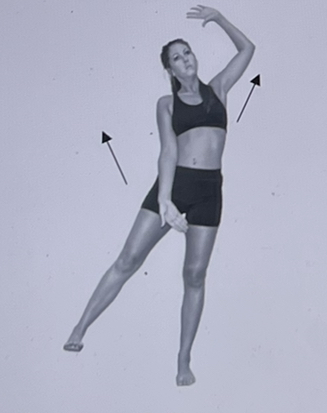
In the figure, what action is occurring at the right shoulder?
Adduction
36
New cards
A lever system with the point force application located between the fulcrum and the resistance is best designed for?
3rd class lever
Increases speed and range of motion
Increases speed and range of motion
37
New cards
A lever system with the resistance between the fulcrum and the force is best designed for?
2nd class
Forced movement
Forced movement
38
New cards
You flex your right hip and extend your right knee to kick a ball. Those muscles of the core and hips which act to keep your pelvis fixed during the kick are acting as what?
Stabilizer Muscles (Fixators)
39
New cards
Calculate the mechanical advantage of a lever system, where the force is 6 newton, the force arm is 10 centimeters, the resistance is 2 newtons, and the resistance arm is 30 centimeters?
0.33
(resistance/force) or (force arm/resistance arm)
(resistance/force) or (force arm/resistance arm)
40
New cards
This type of muscle contraction produces force that is less than the resistance?
Eccentric
41
New cards
This type of muscle contraction results in a joint angle change in the direction of applied resistance?
Eccentric
42
New cards
In the scenario where a force is applied to the axle, then the advantage of the wheel and axle system is that _____?
Wheel turns a greater distance at greater speed
43
New cards
This type of stimulus sends action potentials to all of the motor units of particular muscle.
Maximal stimuli
44
New cards
When the same actions occur simultaneously at both joints of a biarticular muscle, the movement pattern may be advantageous because?
???
45
New cards
Which of the following terms refers to a cavity or depression?
Facet
Foramen (hole)
Fossa
Fovea
Meatus
Notch
Sinus
Sulcus
Foramen (hole)
Fossa
Fovea
Meatus
Notch
Sinus
Sulcus
46
New cards
Which of the following terms refer to a cavity or depression?
Facet
Foramen (hole)
Fossa
Fovea
Meatus
Notch
Sinus
Sulcus
Foramen (hole)
Fossa
Fovea
Meatus
Notch
Sinus
Sulcus
47
New cards
These muscles have shorter fibers arranged obliquely to the tendon:
Oblique/ pennate
48
New cards
Which of the following characteristics give the muscle "rectus abdominis" its name?
Type of fiber and location
49
New cards
Which of the following is a characteristic that gives the skeletal muscle "sternocleidomastoid" its name?
Location (origin and insertion)
50
New cards
Which of the following joints does NOT have motion in the sagittal plane?
Trochoid
(basically any joint that does not perform flexion/extension)
(basically any joint that does not perform flexion/extension)
51
New cards
Which of the following muscle pulls on the ulna without rotation, making it the only pure flexor of the elbow joint?
Brachialis
52
New cards
A typical movement resulting from concentric contraction of this muscle is pronation of the forearm, especially while the elbow flexes.
Brachioradialis
53
New cards
The muscle originates on the anterior surface of the 3rd-5th ribs and inserts on the coracoid process of the scapula. What action does this muscle have?
Muscle: pectoralis minor
Action: protraction, downward rotation
Action: protraction, downward rotation
54
New cards
This muscle originates on the surface of the upper 9 ribs and inserts on the medial border of the scapula. What action does this muscle have?
Muscle: serratus anterior
Action: protraction, upward rotation
Action: protraction, upward rotation
55
New cards
Which of the following is not one of the three joints of the shoulder girdle?
Sternoclavicular
Acromioclavicular
Scapulothoracic
Acromioclavicular
Scapulothoracic
56
New cards
Why are muscles that are associated with the shoulder girdle called into action during extreme ranges of motion of the shoulder joint?
Their contraction moves the clavicle so its glenoid fossa remains in a position from which the humerus can move
57
New cards
The supraspinatus muscle is used:
Abduction (apart of the rotator cuffs)
provides dynamic stability during throwing
most injured rotator cuff muscle
Rotator cuff important for health of shoulder joint
provides dynamic stability during throwing
most injured rotator cuff muscle
Rotator cuff important for health of shoulder joint
58
New cards
What muscle originates on the distal supracondylar ridge of the humerus, inserts on the lateral surface of the distal radius, and can perform actions in 2 planes?
Brachioradialis
59
New cards
What muscle originates on the anterior distal humerus, inserts on the ulnar coronoid process, and has movement in a single place?
Brachialis
60
New cards
Which of the following is an action performed by the rhomboids when concentrically contracting?
Elevation
Downward rotation
Retraction
Downward rotation
Retraction
61
New cards
Abduction of the shoulder joint is described as?
Think of doing a jumping jack, take away from the body
Ppward lateral movement of humerus out to the side, away from the body, in the plane of the scapula
Ppward lateral movement of humerus out to the side, away from the body, in the plane of the scapula
62
New cards
Adduction of the shoulder joint is described as?
Adding it back to the body
Downward movement of humerus medially toward the body from abduction, in the plane of the scapula
Downward movement of humerus medially toward the body from abduction, in the plane of the scapula
63
New cards
This muscle can provide elevation and weak retraction of the scapula:
Levator scapulae
64
New cards
Which of the following muscles contributes to flexion of the glenohumeral joint when concentrically contracting?
Pectoralis major, coracobrachialis, Anterior deltoid all contribute to flexion.
65
New cards
Which of the following muscles contributes to extension of the glenohumeral joint when concentrically contracting?
latissimus dorsi, Posterior deltoid, Teres major, subscapularis , Infraspinatus, Teres minor all do extension.
66
New cards
Which of the following is an antagonist of the latissimus dorsi?
Deltoid and trapezius muscle
67
New cards
Which of the following is an antagonist of the coracobrachialis?
The deltoid
(but can also be infraspinaous and Latissimus dorsi)
(but can also be infraspinaous and Latissimus dorsi)
68
New cards
Which of the following is a muscle in the rotator cuff group?
Supraspinatus, infraspinatus, subscapularis, and teres minor
69
New cards
Which of the following bony landmark is located on the proximal end of the radius?
Head
Radial tuberosity
Radial tuberosity
70
New cards
Which of the following bony landmarks is located on the distal end of the humerus?
Supracondyloid ridges
Olecranon fossa
Medial/lateral epicondyles
Capitulum
Trochlea
Olecranon fossa
Medial/lateral epicondyles
Capitulum
Trochlea
71
New cards
Which combination of muscles best describes those used to turn a doorknob clockwise and push the door open using your RIGHT hand and arm?
Biceps brachii, supinator, and brachioradialis
72
New cards
This muscles originates on the inferior scapula, inserts on the intertubercular groove of the humerus, and assists in extension of the humerus
Teres major
73
New cards
This muscle originates on the clavicle, ribs 1-6, and sternum, inserts on the intertubercular groove of the humerus, and functions during pushing type movements (push-ups, throwing, benchpress)
Pectoralis major
74
New cards
During full extension of the elbow, the _____ of the ulna is received by the _____ of the humerus
Olecranon process, olecranon fossa
75
New cards
Movements of the proximal radioulnar joint involve movements between?
Radial head against the ulna and the capitulum of humerus
76
New cards
Which of the following muscles produces shoulder girdle movements?
Any muscles apart of the shoulder girdle
Levator scapulae, pectoralis minor, serratus anterior, trapezius, rhomboids, subclavius
Levator scapulae, pectoralis minor, serratus anterior, trapezius, rhomboids, subclavius
77
New cards
Which of the following is a bony landmark located on the proximal humerus?
Head
Greater tubercle
Lesser tubercle
Intertubercle groove
Greater tubercle
Lesser tubercle
Intertubercle groove
78
New cards
The deltoid tuberosity is located?
On the humerus
79
New cards
Which of the following is NOT an action caused by the concentric contraction of the biceps brachii?
ANYTHING RELATING TO EXTENSION
Action at glenohumeral: weak flexor/abduction, horizontal adduction
Action at elbow (main function): flexion and supinator
Action at glenohumeral: weak flexor/abduction, horizontal adduction
Action at elbow (main function): flexion and supinator
80
New cards
Which of the following muscles antagonizes the levator scapulae?
Posterior deltoid
81
New cards
Which of the following is a primary action of the latissimus dorsi muscle at the glenohumeral joint?
Extension of the glenohumeral joint
82
New cards
Which of the following is a primary action of the trapezius muscle at the glenohumeral joint?
Upper fibers: elevation, upward rotation (weaker)
Middle fibers: Elevation, upward rotation, retraction (stronger)
Lower fibers: depression, retraction (weaker)
Together: pull upward and retract simultaneously.
Middle fibers: Elevation, upward rotation, retraction (stronger)
Lower fibers: depression, retraction (weaker)
Together: pull upward and retract simultaneously.
83
New cards
During the lifting phase of a pull-up, elbow flexion is ______
concentric
84
New cards
During the lowering phase of a push-up, elbow flexion is _____
eccentric
85
New cards
Horizontal adduction of the glenohumeral joint is described as?
bring the arm horizontally towards the middle of the body
86
New cards
Diagonal adduction of the glenohumeral joint is described as?
Start from top and bringing it down diagonally
87
New cards
The concentric contraction of the muscle originating on the base of the skull and the cervical and thoracic vertebrae, and inserting on the clavicle and scapular spine would cause which action?
Muscle: trapezius
Upper fibers: upward rotation and elevation
Middler fibers: upward rotation, elevation, retraction
Lower fibers: depression, retraction
All: upward rotation, retraction
Upper fibers: upward rotation and elevation
Middler fibers: upward rotation, elevation, retraction
Lower fibers: depression, retraction
All: upward rotation, retraction
88
New cards

Which muscle is shown in the image below?
Deltoid
89
New cards
What type of joint is the sternoclavicular joint?
Arthrodial (plane) joint or Sellar (saddle joint)
90
New cards

Which of the pictures below is the best illustration of th emovement resulting from the concentric contraction anterior and pectoralis minor?
Serratus anterior + pectoralis minor = protraction
C
C
91
New cards
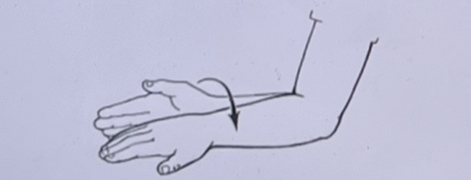
What action is shown in the image?
Pronation (pouring out the soup)
92
New cards
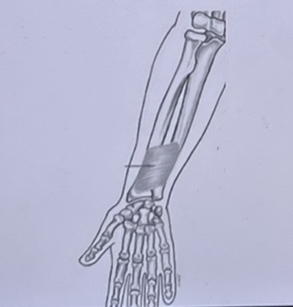
What muscle is shown in the figure below?
Pronator quadratus
93
New cards
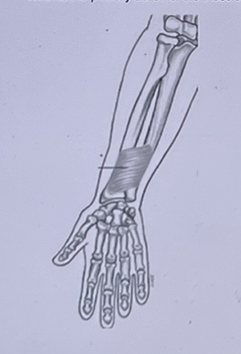
What is the primary action of the muscle in the figure below?
Pronator quadratus
Pronation
Pronation
94
New cards
Which of the following bony landmarks is located on the posterior surface of the scapula?
Acromion process
Glenoid fossa
Lateral border
Inferior angle
Medial border
Spine
Infraspinous fossa
Glenoid fossa
Lateral border
Inferior angle
Medial border
Spine
Infraspinous fossa
95
New cards
Which of the following bony landmarks on the anterior surface of the scapula?
Subscapular fossa
96
New cards
Which of the following bony landmarks is located on the anterior superior surface of the scapula?
Coracoid process
97
New cards
What action at the shoulder joint is paired with depression of the shoulder girdle?
Extension
98
New cards
Shoulder girdle movement resulting in the inferior angle of the scapula moving laterally and superiorly is called?
Upward rotation
99
New cards
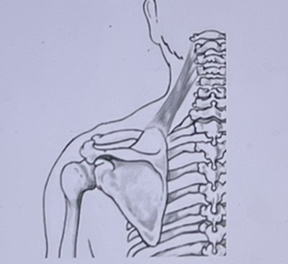
What muscle is shown in this figure?
Levator Scapulae
100
New cards
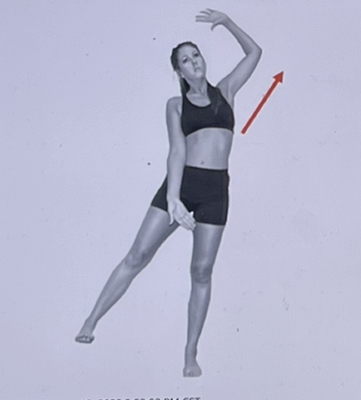
What frontal plane action is occurring at the glenohumeral joint of the figure's left side, assuming movement in the direction of the arrow?
Abduction